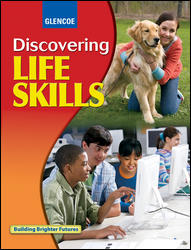Discovering Life Skills ©2010Chapter 4:
Communicate with OthersCheck Your Answers: After You ReadSection 4.1 Listening and Speaking Skills - Speak for yourself; be clear and direct; be aware of your listener; ask questions.
- Give full attention to the speaker; concentrate on what the speaker is saying; listen for overall meaning; remember to notice nonverbal cues; avoid making quick judgments; resist distractions; give feedback to indicate understanding.
- Talking about people and their personal lives can destroy friendships and ruin reputations.
- Paragraphs should describe a conversation you observed, with details about who said what to whom. Include a description of how things were said, such as whether or not body language was used, what perceptions may have existed, or if tone of voice was a factor. Conclude with an evaluation.
- Answers may include that cell phones, e-mail, text messages, and instant messages have replaced landline telephones, letters, and greeting cards. You may believe the changes are positive because communication is easier and faster; or, you may believe the changes are negative because communication is less personal.
Section 4.2 Handle Conflict - Gossip is unkind and can lead to rumors, damage friendships, and ruin reputations.
- Write in a journal, listen to or play music, exercise, get some rest, or talk to someone.
- Negotiation is when people discuss the conflict for the purpose of resolving it. Sometimes they use a mediator. Together, they can compromise and come to an agreement.
- E-mail should include details about the disagreement and how it began. You may suggest a place and time to meet your friend to talk about possible compromises.
- You would probably feel hurt, angry, and disappointed. The person could miss out on a friendship because he or she allowed stereotypes to interfere with accepting you for who you are.
 | 




